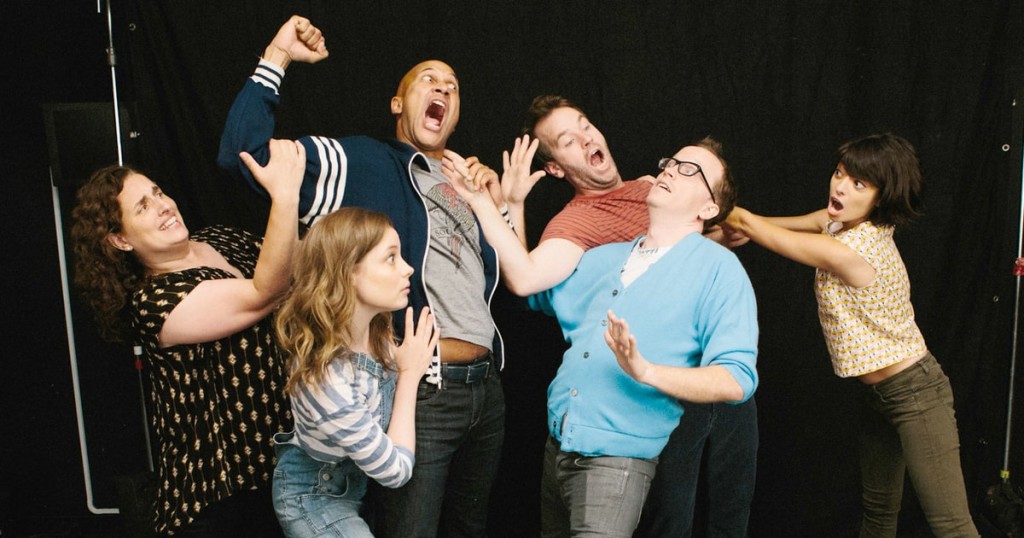So I want to share a rare experience with all of you, something that doesn’t happen to me often these days. I sat down to watch a movie, and for the next 100 minutes was completely unaware that I was watching a movie.
In my reality, everything is analyzed. Even if I don’t want to analyze, I analyze. Oh, what a perfect setup for that character. Oh, what a terrible way to open that scene. No! You could’ve milked that moment so much longer. Ugggh, you should’ve focused the story on this character. He’s so much more interesting!
None of that happened in this movie. What movie am I talking about? It’s Mike Birbiglia’s film, Don’t Think Twice (Here are Mike’s six tips for making it in Hollywood). It’s about a long-time improv group, all of whom are in their 30s. When their improv space closes down, they have to face the reality that maybe this is it. Maybe they need to go out into the real world and give up on their dreams.
Things go sideways when the flashiest member of the group, Jack, becomes a cast member on Weekend Live (a “Saturday Night Live” stand-in). Not only is there all this pressure on Jack to succeed. But there’s pressure on him to bring his friends up with him. In the end, that pressure becomes too much for everybody and… well, I’ll let you watch it yourself to find out what happens.
So what made this experience so impactful?
One thing: The characters.
Whenever I see a writer pull great characters off, I take a good two hours afterwards to digest it all. Because character-creation remains the single most difficult thing to do in screenwriting.
Anyone can create characters. You think of a person then give them a name. And sadly, that’s how most screenwriters approach character creation. But to build characters who move you? Who leave you in tears? That’s the real test.
How did he do it? How did Mike Birbiglia move someone who’s used to all the tropes and sees them coming from a mile away? Let’s see if we can shed some light on that question.
First of all, there’s no question that the performances in “Don’t Think Twice” were amazing. I know it doesn’t help us as screenwriters to say that. But we can’t deny that that’s part of it. However, actors can’t make chicken salad out of chicken shit. They need a foundation to start from. And if the foundation of their character isn’t in the script? Forget about it.
One thing I noticed is the same thing I was talking about in Isle of Man, which is this notion of specificity. Specificity isn’t listed in most character creation articles because it’s more of a peripheral thing. But boy does it have an effect on the finished product.
Just like Younger knew the motorcycle racing world and the people in it like the back of his hand, Birbiglia knows the improv world and the people in that universe like the back of his entire body. I wouldn’t be surprised if these characters were amalgams of many people he’s known in the community for years.
The girl who’s working on that graphic novel for the ninth year and who everybody knows will never finish it. The guy where improv comedy is the only thing he has in his life. The teacher who teaches all these successful people, yet isn’t successful himself. The girl who can’t get out of her own way, sabotaging every chance at success she gets. The woman who’s gotten a free ride from her rich parents her whole life and has never known the meaning of hard work.
Specificity is the fruit of write-what-you-know’s labor. It isn’t so much the world that matters when you write what you know. But the characters, since those characters will be based on the types of people you’ve had personal experiences with. That’s what makes them SPECIFIC.
And the more specific you can make a character, the more we will believe that they’re real. And the more we believe that they’re real, the more we’ll root for them. And the more we root for them, the more emotionally devastated we’ll be when they don’t achieve what they set out for.
With that said, specificity is not about reams of character detail. It doesn’t mean that a character has to do something specific and unique on every single page. It merely means that the character is specific to the world they’re in. That they feel true and honest and not “made up” by a writer who’s clearly never stepped foot in the world he’s writing about.
If you look back at my above character descriptions, they don’t go for pages on end. They’re each simple and to-the-point. “The girl who can’t get out of her own way, sabotaging every chance at success she gets.” Not enough screenwriters do this – come up with that single specific sentence that identifies their character. As a result, they’re never sure who that character is. And you can feel that when they write them. You can feel that they’re searching for that character all the way until the final page.
There are other things going on here as well. These are all underdogs (an underdog is one of the easiest ways to get an audience to root for your character). They weren’t the popular kids at school. They were the nerds. And this is their only chance at becoming the popular kid. And you can see how much they want that. And because they want it, you want it for them.
But there’s something new I found in this movie. And this is going to sound cheesy, but I believe there’s something to it. The power of friendship. When two or more characters love each other, it’s like they double the power of the characters as individuals.
Because we don’t only want the character to succeed for themselves. We want them to succeed for their friend. We saw this on display in one of the greatest movies ever made – The Shawshank Redemption – with Andy and Red. Each of them were wonderful characters individually. But, in the end, it was that we wanted them to win together. That’s what sparked our tears when they meet up in Zihuatanejo in that final shot.
And I saw that here with this group. You got the sense that they all loved each other and it was “them against the world.” So when Jack makes it and that results in the group fractioning off, the engine that drives the story isn’t a goal, like we traditionally talk about on Scriptshadow, but rather our desire to see the group get back together, to be happy again.
I haven’t come up with a definitive model on how to do this, but they used it for the last fifth of “Shawshank Redemption,” after Andy escapes. And they used it for the last third of “Room,” where “Ma” was placed in a mental hospital. These are two of the most emotionally powerful movies in history, which is how I know this is something worth looking into further.
Finally, I’m a huge believer that a movie must end on some form of hope. You can take us to the lowest of lows, rake us through the shitshow of life. But if you don’t provide us with some sort of hope at the end – no offense to you or your writing, but fuck you. You wasted 2 hours of our lives.
The best part about “Don’t Think Twice” is that it’s able to provide us with hope without selling out. By “selling out” I mean not everyone gets on Weekend Live. Instead, the group goes its separate ways. And yeah, some of them quit improv. But everyone’s got a plan. Everyone’s going to keep fighting this complex ever-changing organism called life. And that’s all we need from an ending. To know that the characters aren’t going to give up on the world.
It capped off one of the most poignent and moving films of the year. Check it out if you haven’t already, and share you character observations in the comments.



